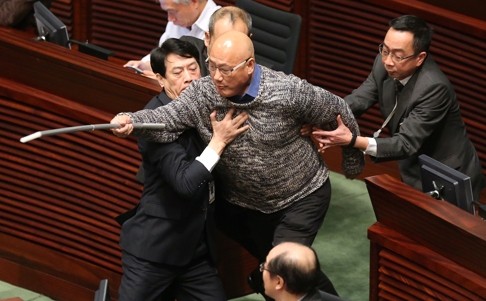Hong Kong leader defends strong focus on Beijing’s trade strategy in policy address
Chief Executive Leung Chun-ying said yesterday’s speech was “not a place” to talk about missing booksellers controversy

Chief Executive Leung Chun-ying this morning defended his unrelenting efforts to sell the importance of the Beijing’s “One Belt, One Road” strategy during his policy address, stressing that it is important for youngsters to learn more about Hong Kong’s “business partners”.
In a phone-in radio programme this morning, some listeners questioned Leung’s emphasis on the strategy, which is primarily aimed at driving cooperation among Eurasian countries along the ancient Silk Road. Leung mentioned the strategy 48 times during his two-hour speech yesterday.
Some listeners found Leung’s use of the phrase “the Belt and Road” confusing as it is a deviation from the strategy’s original name, while others expressed doubts on the proposal to entice students from One Belt, One Road nations to study undergraduate courses in the city.
READ MORE: Hong Kong chief executive sidelines politics to ride on China’s One Belt, One Road economic strategy in policy address

“Hong Kong has a very heavy reliance on the outside world, it is important for [students] to learn more about the major business partners,” Leung said. “If it was not mentioned in the policy address, others would have faulted [it].”
“The strategy is to connect [with these countries] in the heart, instead of talking about business up-front.”
Leung said he also hoped local primary or secondary schools would teach students on the concept, but stressed that it was not a mandatory move. Schools would be free to design their own curricula without giving extra pressure to students, he said.
